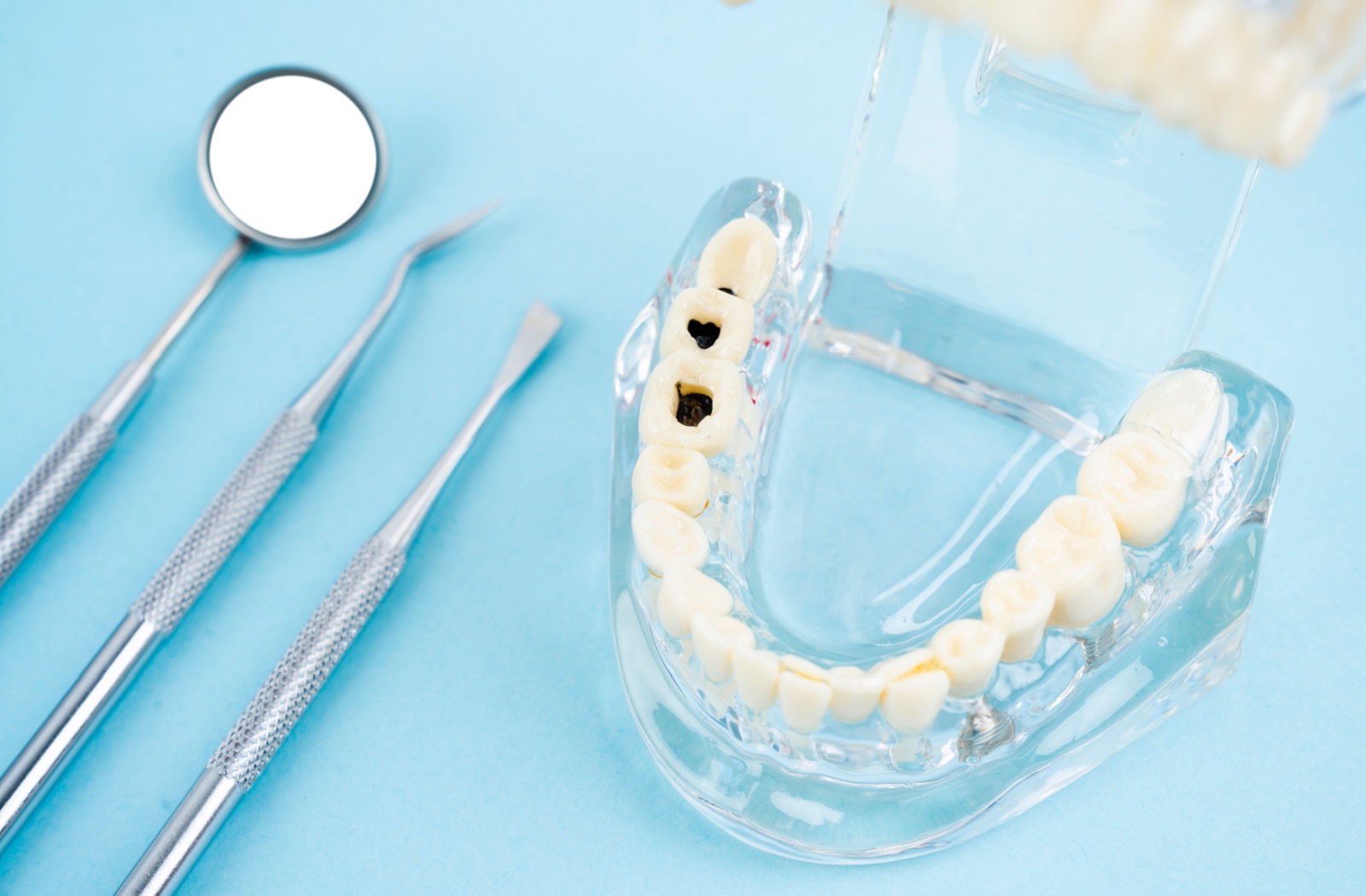When it comes to replacing missing teeth, you have options. From partial dentures to bridges, people are looking to invest in their smiles. After all, it leaves a lasting impression!
Dental implants are a trusted solution for smile restoration, taking the lead with their durability. Because their material isn’t susceptible to damage and decay the way natural teeth are, dental implants do not get cavities. But that doesn’t mean they are indestructible. They still require proper care to preserve your overall health.
Dental Implants Defined
Everyone has a different smile journey. For some people, dental implants are part of it.
Dental implants are a durable solution for missing teeth, seamlessly blending in with your remaining natural teeth. Yes, dental implants are artificial, which explains why they don’t damage or decay like natural teeth.
A dental implant has 2 main components: the implant (which acts as a tooth root) and the crown (the visible, artificial tooth).
The implant itself is made from a strong metal that integrates well with the jawbone, preserving bone structure, and is surgically placed. The crown is usually made from porcelain, ceramic, or sometimes metal alloys.
Since cavities develop from bacteria that produce acid and eat away at tooth enamel, which is something that implants don’t have, they simply can’t develop cavities in the traditional sense. In other words, you won’t expect a porcelain plate to get a cavity, and the same principle applies to your implant crown.
The Truth About Cavities
Keeping your teeth healthy and strong is what dental care is all about, and cavities are a common threat to your smile.
When you eat or drink, especially sugary or starchy foods, bacteria in your mouth feed on these substances and produce acid as a byproduct. This acid attacks your tooth enamel, gradually wearing it down and creating tiny holes—a cavity.
With time, the cavity deepens and gets bigger, reaching the inner layers of your tooth. This is usually when people notice hallmark symptoms of tooth sensitivity and pain.
Since dental implants don’t have this vulnerable enamel layer, the cavity formation process simply can’t happen. The materials used in implants are resistant to acid and bacterial damage.
What About the Area Around Dental Implants?
You’re not fully off the hook yet, because while the implant itself can’t get cavities, the area around it still needs attention. If you have natural teeth next to your implant, those teeth can definitely develop cavities if you don’t maintain good oral hygiene.
Cavities aside, neglecting to care for your implant can lead to other problems, including:
- Gum disease: Just like with natural teeth, poor oral care can cause gum disease around the implant, leading to inflammation, bleeding, and discomfort.
- Peri-implantitis: Similar to gum disease, this condition develops when bacteria and plaque build up around the implant site.
- Bone loss: If the surrounding bone becomes infected or weakened, it can compromise the stability of the dental implant, potentially causing it to loosen.

Protect Your Dental Implant: Signs to Watch For
Even though implants can’t get cavities, you should still be aware of warning signs that something might be wrong:
- Bleeding or swollen gums around the implant
- Pain or discomfort around the implant site
- Loose or shifting implant
- Bad taste or odour coming from the implant area
- Visible recession of the gum around the implant
If you notice any of these symptoms, contact your dentist right away. Early intervention can often prevent more serious problems.
Caring for Your Dental Implants
With good hygiene and care, your dental implants can last a lifetime. Here’s how to make the most of them:
Daily Cleaning Routine
- Daily brushing: Brush your implants just like you would your natural teeth, twice a day with a soft-bristled toothbrush. Use fluoride toothpaste, as it won’t harm your implants and can help protect any remaining natural teeth.
- Routine flossing: Flossing around implants is crucial. You might need special floss or interdental brushes to clean effectively around the implant site. Your dental hygienist can show you the best techniques for your specific situation.
- Antimicrobial mouthwash: Consider using an antimicrobial mouthwash to help reduce bacteria in your mouth. This can be especially helpful for preventing peri-implantitis.
Regular Dental Visits
Keep up with your regular dental exams and cleaning appointments, aiming for visits every 6 months. Your dental team will monitor your implants (and natural teeth) and the surrounding tissues to catch any potential issues early.
Professional cleanings are important because they remove plaque and tartar that you might miss, even with the most diligent at-home care routines. Your hygienist has special tools and techniques to safely and effectively clean around implants.
What to Avoid
Dental implants are durable, but they don’t have super-strength. Here are some other ways you can damage them:
- Physical trauma: Accidents, sports injuries, grinding your teeth (consult your dentist about nightguards), or even chewing on hard objects (such as ice, pencils, or hard candies) can cause damage to the implant or the surrounding bone.
- Poor oral hygiene: Neglecting your oral hygiene can lead to gum disease and bone loss, which can compromise the stability of the implant.
- Smoking: This reduces blood flow to the gums and can interfere with healing. If you smoke, quitting can significantly improve your implant’s long-term success.
Your Implants Are Built to Last
Dental implants are an investment. Like any investment, they require ongoing attention to reap their full benefits. Fortunately, caring for your dental implants is far from complex; consistent oral hygiene and routine dental exams and cleanings are all it takes to keep your smile beautiful and strong.
If you have questions about your specific implants or oral health needs, we’re here to help. Connect with Markham Dental Smiles to book an appointment for your routine dental exam and cleaning.







